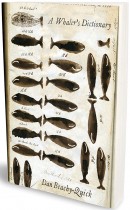 This post is written by a guest, Levi Stahl, who blogs at I’ve Been Reading Lately:
This post is written by a guest, Levi Stahl, who blogs at I’ve Been Reading Lately:
The many, many readers who hate Moby-Dick commonly cite its pages and pages about whales as evidence of its failure as a novel. What on earth is all that relatively undigested encyclopedia-style information doing in the middle of a book that, at least in its early chapters, promises to tell us a story?
Those of us who’ve fallen under Melville’s spell, while we understand that complaint, would argue that it misses the point: the information about whales is there because Ishmael (and Melville) wants to wrestle this unruly world to the ground, encompass and understand it — but all while acknowledging its disorganized glory. Ishmael can’t ever quite codify his knowledge of whales, and in fact, like many other initiatives in the novel, his attempt breaks off abruptly, overtaken like so much else in life by other, more urgent demands. But those of us who find ourselves reading Moby-Dick over and over again understand the impulse that drives him — and thus, in a way, the impulse that drives Ahab.
Dan Beachy-Quick, in his introduction to his A Whaler’s Dictionary, explains that the book “does not finish Ishmael’s failed cetological endeavor — it simply repeats the failure in a different guise.” From there, Beachy-Quick follows his thoughts through a literary and philosophical lexicon that runs from “Accuracy” to “You/Thou,” with cross-references leading us ever deeper into its byways. Under “Fear,” he investigates Starbuck’s rule that no man may serve in his boat “who is not afraid of a whale.” The entry for “Mincer,” the word for the man whose job is to cut blubber, leads unexpectedly to a parable about writing.
A Whaler’s Dictionary is, as Beachy-Quick himself advises, not a book to be read straight through. It’s a book to be kept at the bedside, flipped through when the pretense of order has taken too firm a grasp of one’s life. As the entry for “Line” notes, “The line connects one to what one wants. The whaler wants the whale. . . . By the line we know when we’re attached to what we desire, and by the line we know when what we desire has escaped.”
Like Moby-Dick, this book is ever-elusive; like Moby-Dick, it rewards our continued pursuit.

